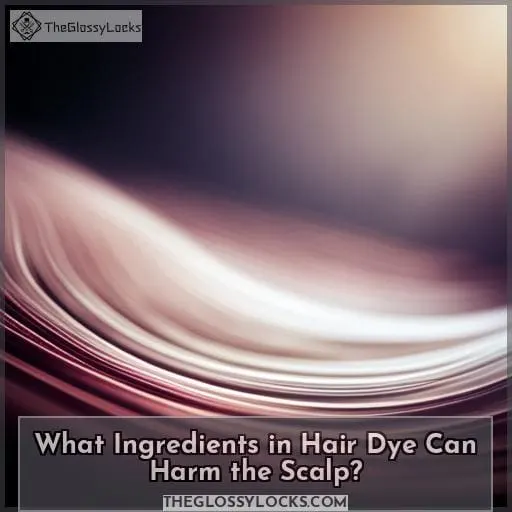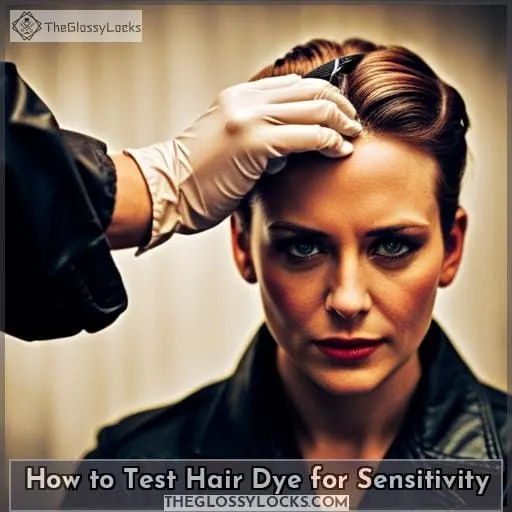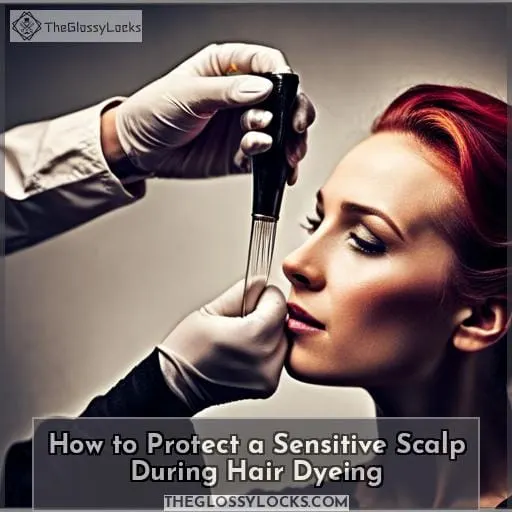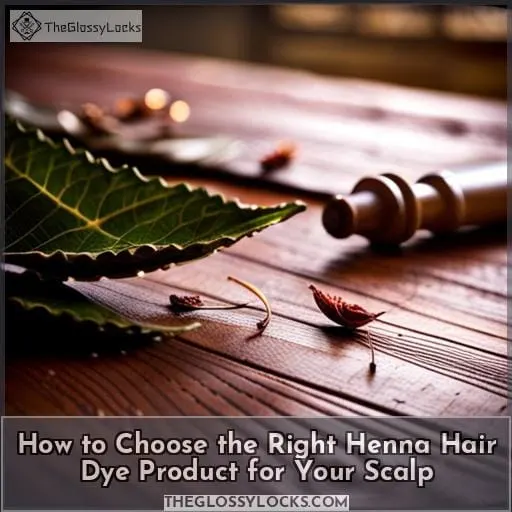This site is supported by our readers. We may earn a commission, at no cost to you, if you purchase through links.
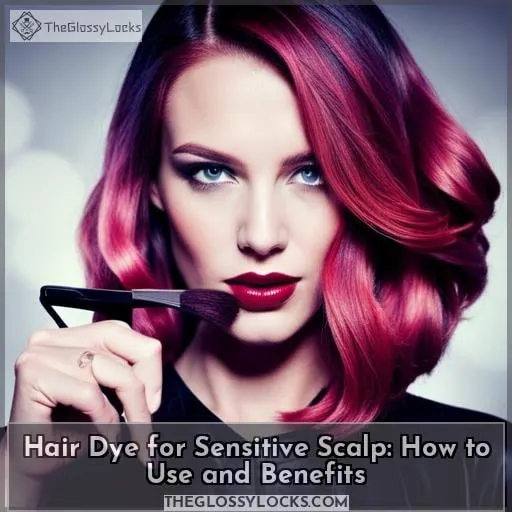 Are you thinking of dyeing your hair but worried that it might cause an allergic reaction on your sensitive scalp? You’re not alone – 44% of people suffer from a sensitive scalp, so finding the right product to use is key.
Are you thinking of dyeing your hair but worried that it might cause an allergic reaction on your sensitive scalp? You’re not alone – 44% of people suffer from a sensitive scalp, so finding the right product to use is key.
Hair dyes can contain ingredients that are harmful to our scalps if we don’t know what to look out for and how to test them.
The good news is, there are products available specifically designed for those with more delicate skin which come with all sorts of benefits too! In this article, we’ll explore the options available when choosing hair dye for a sensitive scalp and discuss some tips on maintaining healthy locks afterwards.
Table Of Contents
- Key Takeaways
- Can I Dye My Hair if My Scalp is Sensitive?
- What Ingredients in Hair Dye Can Harm the Scalp?
- How to Test Hair Dye for Sensitivity
- How to Protect a Sensitive Scalp During Hair Dyeing
- What Are the Signs and Symptoms of a Hair Dye Reaction?
- The Benefits of Using Henna Hair Dye for Sensitive Scalps
- Why Choose Henna Hair Dye for Sensitive Scalps
- Additional Benefits of PPD-Free Hair Dye
- How to Choose the Right Henna Hair Dye Product for Your Scalp
- Tips for Maintaining a Healthy Scalp and Allergy-Free Hair With Henna
- Conclusion
Key Takeaways
- Choose hair dyes that are free of harmful ingredients like ammonia and PPD.
- Conduct a patch test 48 hours before dyeing to check for adverse effects.
- Consider using henna as a natural alternative for sensitive scalps.
- Use specialized shampoo and conditioner for colored hair to maintain and protect the color.
Can I Dye My Hair if My Scalp is Sensitive?
If you’ve got a sensitive scalp, it’s essential to take precautions when dyeing your hair for vibrant color without irritation. Before selecting a hair color option, familiarize yourself with the potentially harmful ingredients found in common dyes like ammonia and paraphenylenediamine (PPD).
Also, consider PPD-free options like henna that nourish the scalp while providing deep shades of color. For any product, conduct a patch test 48 hours before dyeing to check for adverse effects or anaphylaxis symptoms such as itching and swelling due to sensitivities or allergies.
Natural alternatives are also available which offer eco-friendly solutions while avoiding chemical irritants altogether—especially beneficial if you have existing skin conditions like psoriasis or eczema! To maintain healthy locks after coloring your hair, make sure to use products specifically designed for colored tresses such as Surya Henna shampoo and conditioners fortified with natural ingredients that protect from sun exposure too!
What Ingredients in Hair Dye Can Harm the Scalp?
Be aware that certain additives in hair dye, such as ammonia, sulfates, and paraphenylenediamine (PPD), can irritate your scalp. It’s important to be mindful of these ingredients when selecting a product for sensitive scalps.
Ammonia is an alkaline compound used to open the cuticle layers of the hair shaft so that color can penetrate more easily.
Sulfates are cleansing agents found in shampoos, which strip away natural oils on the scalp, leading to dryness and itchiness if you’re prone to reactions.
PPD is another common allergen present in many dyes, especially darker shades. This ingredient should be avoided at all costs due to its potential allergic reaction causing skin rashes or even anaphylaxis shock symptoms!
To protect against any possible adverse effects from these substances, performing a patch test 48 hours before application will help identify potential sensitivity issues beforehand and prevent serious reactions from occurring later down the line!
Consider switching out commercial dyes with henna products too. They contain no PPD but boast numerous benefits such as strengthening follicles while nourishing your scalp without harsh chemicals!
How to Test Hair Dye for Sensitivity
Now that you’re aware of the ingredients in hair dye that can harm sensitive scalps, the next step is to test your chosen product before use. Testing for sensitivity helps prevent any irritation or allergic reaction on application.
To ensure scalp health and safety when dyeing, a skin test should be performed 48 hours prior to using any hair dyes with chemicals.
Here are four steps for testing:
- Apply a small amount of diluted solution from inside the elbow crease or behind the ear.
- Wait 24-48 hours and observe if there’s redness, itching, or flaky skin.
- If no negative symptoms occur after 48 hours, then proceed with full application.
- If an allergy occurs during the patch test, stop usage immediately and seek medical advice!
Sensitivity prevention through careful testing is key – follow these guidelines to safely achieve vibrant color without damaging delicate scalps!
How to Protect a Sensitive Scalp During Hair Dyeing
Take great care of your scalp when considering hair color choices. To ensure maximum safety and prevent allergic reactions, there are several precautions you can take:
- Always perform a patch test 48 hours in advance to check for potential dye allergies or skin irritations from chemicals such as PPD.
- Look for PPD-free dyes containing natural ingredients like henna to minimize the risk of irritation while nourishing your scalp with antifungal benefits and strengthening follicles against hair loss.
- Use a specialized shampoo and conditioner designed specifically for dyed hair. This will protect against damage caused by chemical processes, keeping it vibrant longer without further irritating sensitive scalps!
- Use protective products like leave-in creams or sprays that act as shields between the dyeing process and your scalp’s delicate skin barrier layer.
By taking these extra steps towards protecting sensitive scalps before applying any sort of dye, you’ll be sure to keep both yourself and those around you safe from unwanted side effects due to an allergy or other reaction!
What Are the Signs and Symptoms of a Hair Dye Reaction?
When dyeing hair, it is important to be aware of the potential reactions that can occur. Hair dyes may contain skin-irritating or allergenic ingredients, and understanding the signs and symptoms of a reaction can help protect sensitive scalps from harm.
Identifying Mild Irritation
Recognize the early signs of a mild reaction to hair dye, such as redness, itching, or flaky skin. These symptoms may indicate an allergic response and should not be ignored when considering scalp sensitivity.
An allergy test 48 hours before dyeing is essential for anyone with sensitive scalps to identify potential allergens like PPD.
Natural options like henna can provide relief from irritation while also nourishing the scalp and helping reduce hair loss due to its antifungal properties. Surya Henna offers a range of specialty products developed specifically for treating sensitive scalps.
Their herbal formulas are free from harsh chemicals and additives that commonly cause allergies associated with traditional dyes.
Taking a proactive approach to identify potential reactions through testing will help protect your scalp health during coloring processes!
Recognizing an Allergic Reaction
Be aware that an allergic reaction to hair dye may cause itching, swelling, and even anaphylaxis. Allergy testing is highly recommended before using any hair dye products; this will help identify any potential sensitivities or allergies before applying a product to the scalp.
Symptoms of a reaction include:
- Itching
- Swelling
- Redness in the skin
- Hives or rashes
- Anaphylaxis (severe reactions requiring immediate medical attention)
Taking preventive measures like allergy tests and assessing ingredients can prevent scalp sensitivity from worsening over time while protecting your health from the long-term impacts of chemicals used in dyes, such as PPD, which can be found in darker shades.
Henna offers numerous benefits for sensitive scalps – it provides nourishment, strengthens follicles, and eliminates dandruff & psoriasis without risking chemical irritants & pollution caused by ammonia-based products.
Considering these factors when choosing your hair color is essential for maintaining optimal scalp health.
The Benefits of Using Henna Hair Dye for Sensitive Scalps
For those with sensitive scalps, henna hair dye can provide a natural alternative to harsh chemicals. Not only does it nourish the scalp and offer antifungal properties, but its cost-effective and eco-friendly qualities make it an ideal choice for safe coloring.
With proper safety precautions in place, you can embrace vibrant color while protecting your scalp health.
Henna: Natural alternative
Discover the benefits of henna, an organic dye with antifungal properties that nourishes your scalp and offers a healthier hair-coloring alternative.
Perfect for sensitive scalps, it strengthens follicles to reduce hair loss while also combating dandruff and psoriasis.
Choose from cream, powder, or bottled henna dyes in various shades – use Color Fixation Shampoo & Conditioner to maintain color!
Be sure to perform a skin test 48 hours before application; if you experience any redness, itching, or flaky skin similar to eczema after using the product, discontinue its usage immediately.
Enjoy beautiful tresses without worrying about harmful additives – make Henna part of your regular scalp care routine today!
Benefits for sensitive scalps
Protect your scalp and keep it healthy with the nourishing effects of henna hair dye! This natural alternative to chemical-laden products offers a variety of benefits for sensitive scalps. Eco-friendly and free from PPD, henna is packed with glycyrrhetinic acid, a powerful antioxidant that guards against inflammation.
Its antifungal properties can combat dandruff and psoriasis while strengthening follicles to reduce hair loss. Plus, you’ll get vibrant color without sacrificing scalp safety – what’s not to love? So go ahead, enjoy beautiful locks without worrying about damage or irritation.
Safety precautions with dye
To safeguard your scalp, it’s wise to be aware of the safety precautions associated with hair dyeing and take extra care when using dyes formulated for sensitive scalps. Consider performing a skin test 48 hours in advance, scour ingredients lists for irritants like PPD, and switch to natural alternatives such as henna that nourish the scalp.
Why Choose Henna Hair Dye for Sensitive Scalps
Are you searching for hair dye that is gentle on a sensitive scalp? Henna has numerous benefits, such as nourishing your scalp, being eco-friendly, and cost-effective.
Benefits of Henna:
Uncover the benefits of henna hair dye for sensitive scalps – from its antifungal properties to strengthening your follicles and nourishing your scalp. Henna is an eco-friendly choice, allowing you to achieve a range of subtle shades without harsh chemicals or ammonia pollution.
Maintenance is simple with Color Fixation Shampoo and conditioner, protecting against sun damage and keeping color vibrant over time.
Nourishes sensitive scalps:
Naturally nourish and strengthen your scalp with henna hair dye for a healthier, more vibrant look.
- Nourished skin and locks thanks to natural extracts;
- Safe from harsh chemicals like PPD;
- Strengthens hair follicles, reducing breakage or loss;
- Eco-friendly option that avoids ammonia pollution. Henna is an excellent way to achieve beautiful color without damaging your delicate scalp!
Eco-friendly and cost-effective
Not only is henna hair dye cost-effective and eco-friendly, but it can also help reduce ammonia pollution by up to 80%, making it an ideal choice for those with sensitive scalps. By opting for natural dyes free from PPD, you can nourish your scalp while avoiding harsh chemicals.
Henna strengthens follicles and helps fight dandruff or psoriasis too! It’s easy to use in powder form or with bottled products at home.
Additional Benefits of PPD-Free Hair Dye
Are you looking for a PPD-free alternative to hair dye that’s safe for sensitive scalps? Henna is an excellent choice as it not only avoids the irritants commonly found in traditional dyes but also provides additional benefits like strengthening hair follicles and combating dandruff.
To enjoy these advantages while protecting your scalp health, follow safety precautions and perform a skin test 48 hours before dyeing.
PPD-free alternatives for sensitive scalps
Explore PPD-free alternatives to help your sensitive scalp feel its best! Hair dyes without paraphenylenediamine (PPD) can provide vibrant color with added nourishment. Henna is a natural option that helps strengthen hair while preventing scalp irritation.
Look for products containing glycyrrhetinic acid and aloe vera to soothe inflamed skin.
Additional benefits of henna hair dye
Discover how henna hair dye can strengthen your hair follicles, combat dandruff and psoriasis, and offer an eco-friendly option. Henna nourishes the scalp with natural ingredients like aritha fruit extract to help maintain healthy locks.
It is free from PPD’s harsh chemicals, so it won’t damage sensitive scalps but still provides a vibrant color result. Plus, its antifungal properties make it perfect for tackling dandruff and psoriasis while conditioning damaged strands without chemical additives.
Safety precautions for hair dye use
To protect your scalp from irritants and allergens, take safety precautions when using hair dye: Perform a skin test before every application; avoid PPD-containing products; for darker shades, leave henna on longer; use Color Fixation Shampoo to maintain color or switch to PPD-free alternatives like henna cream/powder.
Henna can nourish the scalp with its antifungal properties while strengthening follicles and reducing potential hair loss. Awareness of these benefits will ensure vibrant hair color without compromising scalp health.
How to Choose the Right Henna Hair Dye Product for Your Scalp
When it comes to dyeing your hair, henna can be a great choice for sensitive scalps. With its natural antifungal properties and eco-friendly benefits, it’s important to know how to choose the right shade of henna as well as maintain its color over time.
Pros and Cons of Henna
When considering dyeing your hair, the pros and cons of henna must be weighed carefully. Henna is a natural alternative to chemical processes, which can protect scalp health, but application tips and allergy risks need to be taken into account.
It has many benefits, including improved follicle strength, nourishment for the scalp, and color variations from deep reds to golds. However, some people are allergic and should test it beforehand, and those with darker shades may require longer applications.
Choosing the Right Shade
When selecting the right hair color, you can customize your look and take care of your scalp by considering the shades available in henna dye. Choose a shade that will best match your skin tone, pigment compatibility, and application technique.
Surya Henna’s range offers an array of colors for every sensitive scalp need while promoting overall health benefits like combating dandruff or psoriasis.
Maintaining Henna Color
Maintaining your henna color upkeep requires periodic shampooing and conditioning with Color Fixation Shampoo and Conditioner for luscious, vibrant locks. With its natural ingredients, it nourishes the scalp while providing long-lasting color longevity.
Additionally, you can protect your hair from sun exposure to keep colors bright! Henne care also offers numerous benefits such as scalp care and dandruff control due to antifungal properties. It also strengthens follicles, which may reduce hair loss. These are all essential components for sensitive scalps using a safe alternative to harsh chemical-based dye products.
To enjoy these benefits, ensure proper maintenance of the product’s use. Do not underestimate regular upkeep!
Tips for Maintaining a Healthy Scalp and Allergy-Free Hair With Henna
By taking precautions and opting for PPD-free henna hair dye, you can ensure a healthy scalp and allergy-free color.
- Make sure to follow the instructions when applying henna and use herbal formula as needed if there is too much irritation in the application process.
- Nourish your scalp with natural ingredients found in henna products, such as fenugreek, neem oil, or aloe vera gel.
- To prevent allergies, choose shades that contain low levels of paraphenylenediamine (PPD).
- Hair dye maintenance includes using Color Fixation Shampoo and conditioner after each application and protecting from sun exposure for best results.
Henna offers an effective way to achieve vibrant hair colors without risking irritating sensitive scalps or causing allergic reactions. With proper care before, during, and after dying with PPD-free options like Surya Henna Powder or Creams, you’ll be able to enjoy beautiful color while providing nourishment for both your hair follicles.
Conclusion
Astonishingly, hair dye for sensitive scalps can not only be safe but also beneficial. There are several ways to ensure you can dye your hair without damaging your scalp. First, test the hair dye for sensitivity before applying it to your scalp. This will help you determine if you have any adverse reactions to the product.
Next, choose the right shade of hair dye for your scalp. It’s important to find a color that suits your skin tone and enhances your natural beauty.
If you have a sensitive scalp, consider using henna as a natural alternative to traditional hair dyes. Henna is free from PPD (paraphenylenediamine) and provides nourishment to those with sensitive scalps.
It not only strengthens hair follicles but is also eco-friendly and cost-effective.
For those looking for a PPD-free option, there are other hair dyes available that can provide the same level of scalp protection as henna. These products are specifically formulated for sensitive scalps and can help you achieve beautiful hair color without risking scalp damage.
Remember to always be mindful of safety precautions when using hair dye. Follow the instructions provided by the manufacturer and perform a patch test before applying the dye to your entire scalp.
In conclusion, with the right precautions and product selection, everyone can enjoy beautiful hair color without compromising the health of their sensitive scalp.


